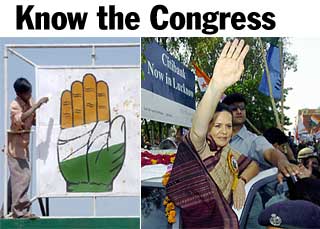Home > News > Elections 2004 > Special
The Rediff Election Special/George Iype
April 08, 2004

Full name
The Indian National Congress
A bit of history
In 1885 retired British civil servant Allan Octavian Hume, Dadabhai Naoroji and others met in Mumbai, to form a 'congress of men and women to articulate the political aspirations of Indians.' Thus, the Indian National Congress was born, but it was not until the emergence of Mohandas Karamchand Gandhi that it became a truly mass-based movement.
First president
W C Bonnerjee
Current president
Sonia Gandhi. Aka high command. Aka 10 Janpath, a reference to her postal address in New Delhi.
Why 'high command'?
Because she has the veto over every decision taken by the party; in fact, all important decisions -- and sometimes unimportant ones -- are taken only after her approval. She settles dispute among factions, finalises appointments to various posts and decides on election candidates.
After her, what?
There is the Congress Working Committee headed by Sonia Gandhi, which has 23 members, 12 permanent invitees and 21 special invitees.
How is the party actually run?
Office-bearers of the All Indian Congress Committee headed by her run the party. The AICC has a group of general secretaries, secretaries, one political secretary and a treasurer. Sixteen senior leaders are in charge of the party in various states. It also has various departments and cells on economic and foreign affairs, minorities, human rights, environment, science and technology, media, planning, police and political training.
The Congress parivar
Includes the Seva Dal, Mahila Congress, Indian Youth Congress, National Students Union of India and the Indian National Trade Union Congress.
Overseas presence
The Indian Overseas Congress based in London and a presence in other countries.
Congress-ruled states, Union Territories, provinces
Assam, Delhi, Himachal Pradesh, Karnataka, Kerala, Maharashtra, Manipur, Meghalaya, Pondicherry, Punjab and Uttaranchal. It was routed in Rajasthan and Madhya Pradesh late last year.
Numbers in Parliament
109 in the Lok Sabha and 64 in the Rajya Sabha.
Ideology
Originated without any well-defined ideology. But by the 1900s, self-rule was the motto. With Mahatma Gandhi came the drive towards total freedom. Its claims since independence of being a secular, socialist party etc have taken a beating, but to its credit it is trying to regain lost ground.
USP
Leading India's freedom movement. Its governments post-1947 played a key role in establishing the foundations of perhaps the most durable democratic political system in the developing world.
Stigma
Declaration of Emergency by Indira Gandhi on June 25, 1975.
Strengths
Grassroots presence, with a nation-wide network down to the village level.
Weakness
Over-dependence on the Nehru-Gandhi dynasty. Personalization and centralisation of power in the party president.
Opportunities
With a growing youth segment, and an ageing political leadership in all parties, now is the time for the Congress to reinvent itself through the infusion of fresh blood and ideas.
Challenge
How to mould itself to appeal to a young India. The country today has some 600 million Indians under 30. The new voters know nothing about the Congress' role in leading the Independence movement or forging a modern India.
Photographs: RAVEENDRAN/AFP/Getty Images EMMANUEL DUNAND/AFP/Getty Images | Image: Dominic Xavier